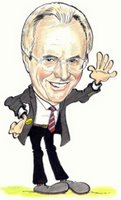
For the "Bahrain Tribune"
England bowler Steve Harmison checked out of his hotel room last Sunday morning which, with ten Pakistan second innings still be taken and three days of the match nominally still to go, was an act of supreme self-confidence. Harmy's confidence was well justified and together with the excellent Monty Panesar, he bowled England to a comprehensive three-day win. I hope that Harmison enjoyed Sunday evening back home with his feet up and surrounded by his family - he certainly deserved to.
Tiger Woods win in the "Open Championship" was, as I commented last week, founded on a superb game plan and excellent course management. But it was also driven by self-confidence bolstered by the fact that the game plan was clearly working. The more you do something, and do it well, the more likely you are to be able to continue doing it well. The more that you are outfought or outwitted by your opponent the more that self-doubt creeps in and you begin to wonder if you will ever win again. There has been a touch of that in the England cricket team since last year's "Ashes" triumph. Missing key players (which has reinforced the self-doubt) and with some of their better players searching for form England has under-performed. When these doubts were conquered (as at the Mumbai Test match when England took advantage of the good fortune of being invited to bat first on a good pitch) they have played to their potential. But when the doubts have crept in (as during most of the home Sri Lanka series) the performances have been sub-standard. At Old Trafford last week the "old" England turned up to play and with Harmison firing well, Monty fizzing the ball off the hard wicket and a couple of young batsman (Cook and Bell) playing really well an innings victory was assured. The challenge is now to build on the self-belief that this win will have engendered and go on to clinch the series at Headingley - don't bet against it!
Self-belief was also to the fore at Hockenheim on Sunday when Ferrari sailed to a brilliant one, two in the German Grand Prix. There were paddock rumours before the race of discontent in the Renault camp - something that I predicted might happen in my pre F1 season preview. Flavio Briatore, the Renault chief, is a flamboyant character and a brilliant tactician as well. Flavio bows to nobody in his knowledge of the sport and in knowing how to convert that knowledge into race victories. But Flavio's self-confidence turns to arrogance rather more than his rivals at McLaren and Ferrari - that is how he lost the services of Fernando Alonso at the end of last season and that is the reason that his grip on the 2006 championship may be weakening. Whereas Ferrari is clearly on a roll - the smiles on the faces of Schumacher and Massa on the podium were smiles of genuine pride rather than relief - Renault is visibly slipping. Alonso is getting edgy and Flavio angry, and that is not good news for the Renault fans. Ferrari, on the other hand, is marshalling all their considerable resources to push for a final championship for Schumi - and to launch a new era for the Scuderia without him - on a high note.
It is sometimes forgotten that in a sport that is so much about the familiar faces of the great champions (Fangio, Clark, Stewart, Prost, Senna and Schumacher) that behind each champion there has to be a formidable team. When doubts creep in to the team (last year's under-performing Bridgestone tyres at Ferrari, for example) then winning is difficult. But when self-belief is all around, as it was with Renault last year and seems to be with Ferrari now, then success becomes almost easy!




